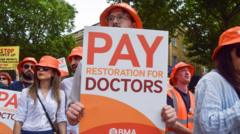Are Doctor Strikes Coming to an End? BMA and Streeting Discuss Progress

Understanding the Ongoing Dispute Between Resident Doctors and the Government
The ongoing negotiations between resident doctors and the UK government have reached a critical phase, sparking discussions about pay, working conditions, and the future of the National Health Service (NHS). With planned strike action looming, both parties are exploring creative solutions to address the grievances of resident doctors, previously known as junior doctors. This article delves into the complexities of the dispute, the implications for the NHS, and what the future may hold for resident doctors in the UK.
The Background of the Dispute
In recent weeks, resident doctors have announced a five-day strike from July 25 to July 30, stemming from dissatisfaction over their pay. The British Medical Association (BMA), representing these doctors, argues that the current pay structure does not adequately reflect the value and importance of their work. Having received a 5.4% pay increase for the current financial year, the BMA contends that this raise is insufficient, particularly when viewed through the lens of inflation. The organization's calculations indicate that, in real terms, resident doctors' pay has decreased by approximately 20% since 2008.
The Pay Structure and Its Implications
Currently, resident doctors in England earn basic salaries ranging from £37,000 to £70,000 annually, depending on their years of experience. This pay structure is accompanied by additional compensation for night shifts and weekend work, which is essential in the demanding field of healthcare. However, the BMA argues that despite recent pay increases, the overall compensation has not kept pace with inflation, particularly when factoring in the Retail Price Index (RPI), which includes housing costs and student loan interest.
The Government’s Position
Health Secretary Wes Streeting has maintained that the government cannot improve its current offer of a 5.4% pay increase. He emphasized that resident doctors have received substantial pay rises over the past few years, amounting to a cumulative increase of 28.9%. Streeting has also pointed out that any further strikes would be "unnecessary and unreasonable," particularly given the current strain on the NHS. He stressed the importance of collaborative efforts to enhance working conditions for doctors without exacerbating the ongoing crisis within the healthcare system.
Constructive Discussions and Creative Solutions
In light of the impending strikes, both parties have engaged in what they describe as "constructive discussions." These talks have focused on potential improvements to working conditions rather than solely on pay increases. Dr. Ross Nieuwoudt, a representative from the BMA, noted that a "window of opportunity" exists for further dialogue, emphasizing the need for genuine solutions that acknowledge the value of being a doctor in the UK.
The discussions have touched on various aspects, including:
- Working hours and schedules
- Support and resources available to resident doctors
- Opportunities for professional development and training
- Measures to mitigate burnout and improve mental health
By exploring these areas, the government and the BMA aim to create a more sustainable working environment for resident doctors, which could ultimately benefit the overall quality of care provided to patients.
The Impact of Strikes on the NHS and Patients
Strikes have significant consequences for both the NHS and patients. In the past, resident doctors have participated in multiple strikes, leading to postponed surgeries and disrupted patient care. This situation has raised concerns about the viability of the NHS, which is already grappling with staffing shortages and increased demand for services.
Streeting's appeal to the BMA to call off the strikes reflects the urgent need to find common ground. The government recognizes that striking can have a serious cost for patients, and thus, it is keen to foster collaboration rather than confrontation.
The Historical Context of Doctor Strikes
The recent history of strikes among resident doctors highlights a growing discontent within the medical profession. In 2023 and 2024 alone, resident doctors participated in 11 separate strikes. These actions were often a response to perceived injustices in pay and working conditions, which have prompted the need for dialogue and negotiation with the government.
In an effort to resolve previous disputes, the incoming Labour government had awarded a backdated pay increase of 22% over two years. While this measure was seen as a step in the right direction, many resident doctors still feel that their compensation does not adequately reflect their contributions to the NHS.
The Future of Resident Doctors in the UK
The outcome of the current negotiations will play a crucial role in shaping the future landscape for resident doctors in the UK. As discussions continue, several key factors will influence the direction of these talks:
- Government Stance: The government’s willingness to explore alternative measures to enhance working conditions will be pivotal.
- Union Negotiations: The BMA's ability to present compelling arguments for pay restoration and improved working conditions will determine the effectiveness of their negotiations.
- Public Support: The public’s perception of the strikes and the healthcare system's state will impact the negotiations, as public opinion can influence political decisions.
As these discussions progress, there is hope that both parties can reach an agreement that alleviates the pressure on resident doctors while ensuring the continued functionality of the NHS. The commitment to developing “creative solutions” reflects a willingness to think outside the box and find common ground.
FAQs
What are the reasons behind the planned strike by resident doctors?
The planned strike is primarily due to dissatisfaction with the current pay structure, which the British Medical Association (BMA) argues does not adequately compensate for inflation and the cost of living. Despite a recent 5.4% pay raise, the BMA claims that real earnings have decreased significantly over the years.
How much do resident doctors earn in England?
Resident doctors in England currently earn between £37,000 and £70,000 annually, depending on their experience. This basic salary can increase with additional payments for night shifts and weekends.
What has the government said regarding the strike action?
Health Secretary Wes Streeting has described the strike as "unnecessary and unreasonable," emphasizing that resident doctors have already received significant pay increases. He has expressed an interest in working on improving conditions rather than further increasing pay.
What are the potential consequences of the strike for patients?
Strikes by resident doctors can lead to postponed surgeries and disrupted patient care, which raises concerns about the overall functionality of the NHS and patient outcomes during the strike period.
What is the BMA's position on the current pay increase?
The BMA argues that the 5.4% pay increase for this financial year is insufficient and does not address the long-term decline in resident doctors’ pay relative to inflation and cost of living, effectively leaving them in a financially challenging position.
Conclusion
The ongoing negotiations between resident doctors and the government represent a pivotal moment for the future of the NHS and healthcare professionals in the UK. As both parties engage in constructive discussions, the potential for creative solutions underscores the importance of collaboration in addressing the pressing issues of pay and working conditions. The outcome of these talks will not only influence the livelihoods of resident doctors but also the quality of care received by patients across the nation.
As we follow this developing story, one must wonder: will both parties find common ground to ensure that the value of resident doctors is recognized and that the NHS can continue to thrive amid these challenges? #NHS #ResidentDoctors #HealthcareStrikes
Published: 2025-07-17 18:18:22 | Category: technology



